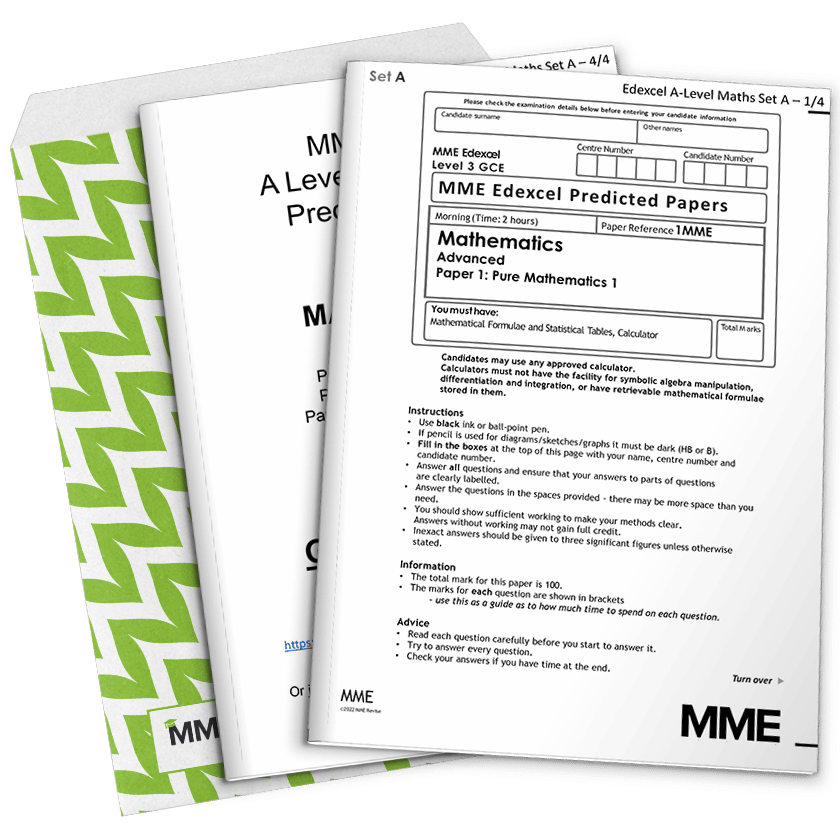More Binomial Expansions
More Binomial Expansions Revision
More Binomial Expansions
In this section we shall look at some advanced skills involving binomial expansion, including partial fractions and approximating.
Make sure you are happy with the following topics before continuing.
Partial Fractions
We can find the binomial expansion of complicated functions by first decomposing them into partial fractions.
Example: Find the first three terms of the expansion of \dfrac{2x+1}{(x-1)(x+2)}.
\begin{aligned}\dfrac{2x+1}{(x-1)(x+2)}&=\dfrac{1}{x-1}+\dfrac{1}{x+2}\\[1.2em]&=(x-1)^{-1}+(x+2)^{-1}\end{aligned}
Now we can do binomial expansion on (x-1)^{-1} and (x+2)^{-1}
\begin{aligned}&\dfrac{2x+1}{(x-1)(x+2)}=(-1)^{-1}(1-x)^{-1}+2^{-1}\left(1+\dfrac{1}{2}x\right)^{-1}\\[1.2em]&=-\left(1-(-x)+\dfrac{-1\times(-2)}{1\times2}(-x)^{2}+...\right)\\[1.2em]&+\dfrac{1}{2}\left(1-\dfrac{1}{2}x+\dfrac{-1\times(-2)}{1\times2}\left(\dfrac{1}{2}x\right)^{2}+...\right)\\[1.2em]&=-\left(1+x+\dfrac{2}{2}x^{2}+...\right)\\[1.2em]&+\dfrac{1}{2}\left(1-\dfrac{1}{2}x+\dfrac{2}{2}\times\dfrac{1}{4}x^{2}+...\right)\\[1.2em]&=-(1+x+x^{2}+...)+\dfrac{1}{2}\left(1-\dfrac{1}{2}x+\dfrac{1}{4}x^{2}+...\right)\\[1.2em]&=-1-x-x^{2}+\dfrac{1}{2}-\dfrac{1}{4}x+\dfrac{1}{8}x^{2}+...\\[1.2em]&=-\dfrac{1}{2}-\dfrac{5}{4}x-\dfrac{7}{8}x^{2}+...\end{aligned}
Approximations from Binomial Expansions
By substituting in certain values for x, we can use the binomial expansion to approximate things.
Example: Use the binomial expansion of (1-3x)^{\frac{1}{4}} to four terms to find \sqrt[4]{0.97}
\begin{aligned}(1-3x)^{\frac{1}{4}}&=1-\left(\dfrac{1}{4}\times3x\right)+\left(\dfrac{\dfrac{1}{4}\times -\dfrac{3}{4}}{1\times2}\times(-3x)^{2}\right)\\[1.2em]&+\left(\dfrac{\dfrac{1}{4}\times -\dfrac{3}{4}\times-\dfrac{7}{4}}{1\times2\times3}\times(-3x)^{3}\right)+...\\[1.2em]&=1-\dfrac{3}{4}x+\left(\dfrac{-\dfrac{3}{16}}{2}\times9x^{2}\right)-\left(\dfrac{\dfrac{21}{64}}{6}\times27x^{3}\right)+...\\[1.2em]&=1-\dfrac{3}{4}x-\dfrac{3\times9}{16\times2}x^{2}-\dfrac{21\times27}{64\times6}x^{3}\\[1.2em]&=1-\dfrac{3}{4}x-\dfrac{27}{32}x^{2}-\dfrac{567}{384}x^{3}\\[1.2em]&=1-\dfrac{3}{4}x-\dfrac{27}{32}x^{2}-\dfrac{189}{128}x^{3}\end{aligned}
Now substitute x=\dfrac{1}{100}
\left(1-3\times\dfrac{1}{100}\right)^{\frac{1}{4}}=1-\left(\dfrac{3}{4}\times\dfrac{1}{100}\right)-\left(\dfrac{27}{32}\times\left(\dfrac{1}{100}\right)^{2}\right)-\left(\dfrac{189}{128}\times\left(\dfrac{1}{100}\right)^{3}\right)
(1-3\times0.01)^{\frac{1}{4}}=1-\dfrac{3}{400}-\left(\dfrac{27}{32}\times\dfrac{1}{10000}\right)-\left(\dfrac{189}{128}\times\dfrac{1}{1000000}\right)
(1-0.03)^{\frac{1}{4}}=1-\dfrac{3}{400}-\dfrac{27}{320000}-\dfrac{189}{128000000}
0.97^{\frac{1}{4}}=0.9916547734
So our estimate is \sqrt[4]{0.97}=0.9916547734, which is very close to the real value of 0.9924141173. Clearly, this approximation method is a very powerful tool.
More Binomial Expansions Example Questions
Question 1: Given that \dfrac{6x^{2}+25x+23}{(x+1)(x+2)(x+3)}=\dfrac{2}{x+1}+\dfrac{3}{x+2}+\dfrac{1}{x+3}, find the binomial expansion of \dfrac{6x^{2}+25x+23}{(x+1)(x+2)(x+3)} up to and including the x^{2} term.
[6 marks]
Question 2: Use the approximation (1-8x)^{\frac{1}{3}}=1-\dfrac{8}{3}x-\dfrac{64}{9}x^{2}+... to find \sqrt[3]{0.84}, giving your answer to 4 decimal places.
This expansion is valid for |x|<\dfrac{1}{8}
[3 marks]
Try x=0.02
(1-8\times0.02)^{\frac{1}{3}}=1-\left(\dfrac{8}{3}\times0.02\right)-\left(\dfrac{64}{9}\times0.02^{2}\right)+...
(1-0.16)^{\frac{1}{3}}=1-\dfrac{0.16}{3}-\left(\dfrac{64}{9}\times0.0004\right)+...
(0.84)^{\frac{1}{3}}=1-\dfrac{16}{300}-\dfrac{0.0256}{9}+...
\begin{aligned}\sqrt[3]{0.84}&=1-\dfrac{4}{75}-\dfrac{256}{90000}+...\\[1.2em]&=1-\dfrac{4}{75}-\dfrac{16}{5625}+...\\[1.2em]&=1-\dfrac{4}{75}-\dfrac{16}{5625}+...\\[1.2em]&=\dfrac{5309}{5625}\\[1.2em]&=0.9438\end{aligned}
Question 3:
i) Express \dfrac{2+9x}{(1+5x)(1+4x)} as partial fractions.
ii) Hence find the first three terms of the binomial expansion of \dfrac{2+9x}{(1+5x)(1+4x)}
[7 marks]
i) \dfrac{2+9x}{(1+5x)(1+4x)}=\dfrac{A}{1+5x}+\dfrac{B}{1+4x}
2+9x=A(1+4x)+B(1+5x)
2+9x=A+4Ax+B+5Bx
A+B=2\;\;5A+4B=9
A=1\;\;B=1
\dfrac{2+9x}{(1+5x)(1+4x)}=\dfrac{1}{1+5x}+\dfrac{1}{1+4x}
ii)
\begin{aligned}&\dfrac{2+9x}{(1+5x)(1+4x)}=\dfrac{1}{1+5x}+\dfrac{1}{1+4x}\\[1.2em]&=(1+5x)^{-1}+(1+4x)^{-1}\\[1.2em]&=1-5x+\left(\dfrac{-1\times(-2)}{1\times2}(5x)^{2}\right)+...+1-4x\\[1.2em]&+\left(\dfrac{-1\times(-2)}{1\times2}(4x)^{2}\right)+...\\[1.2em]&=1-5x+\left(\dfrac{2}{2}\times25x^{2}\right)+...+1-4x\\[1.2em]&+\left(\dfrac{-1\times(-2)}{1\times2}16x^{2}\right)+...\\[1.2em]&=2-9x+25x^{2}+16x^{2}+...\\[1.2em]&=2-9x+41x^{2}+...\end{aligned}Question 4: Find an approximation for \dfrac{1}{0.93^{3}} by first expanding (1-7x)^{-3} to five terms.
[8 marks]
Use x=0.01
(1-7\times0.01)^{-3}=1+(21\times0.01)+(294\times0.01^{2})+(3430\times0.01^{3})+(36015\times0.01^{4})+...
(1-0.07)^{-3}=1+0.21+(294\times0.0001)+(3430\times0.000001)+(36015\times0.00000001)+...
0.93^{-3}=1+0.21+0.0294+0.00343+0.00036015+...
\begin{aligned}\dfrac{1}{0.93^{3}}&=1+0.21+0.0294+0.00343+0.00036015+...\\[1.2em]&=1.24319015\end{aligned}
More Binomial Expansions Worksheet and Example Questions
Algebra
A LevelYou May Also Like...

MME Learning Portal
Online exams, practice questions and revision videos for every GCSE level 9-1 topic! No fees, no trial period, just totally free access to the UK’s best GCSE maths revision platform.







